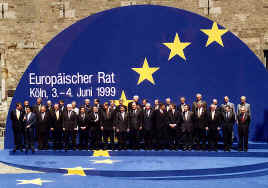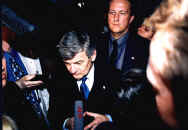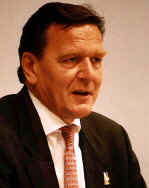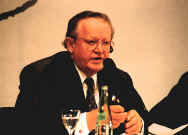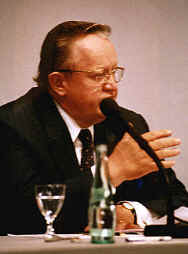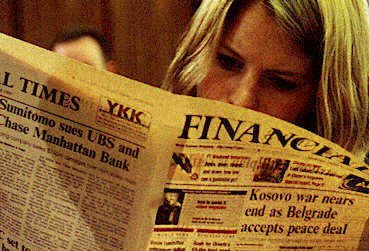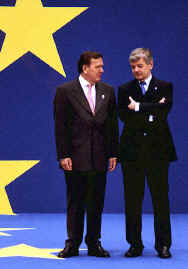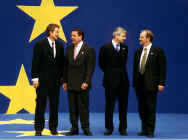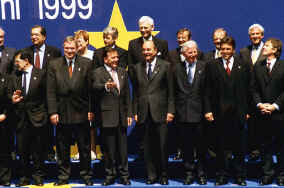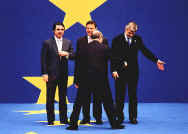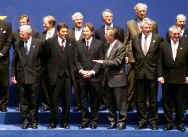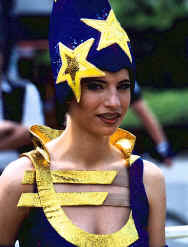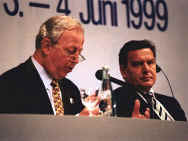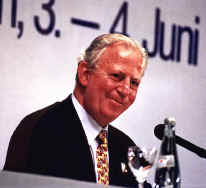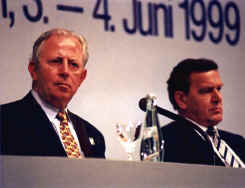|
various pictures of Bill Clinton, etc...
The
EU-Summit in Cologne
TV-newscaster
asking Mr. Fischer: The peace-mission, if successful, will
be a great political success for you!
When I got involved we had first of all bi-lateral meetings. I met Mister Chernomyrdin, I met Mister (**) of the general Secretary of State. I said last day to them that it would be absolutely vital we started the meetings three of us in the same room. That didn't exclude the possibility that there were bi-lateral meetings when I was not there. But for me it was absolutely vital. There were no misunderstandings. No doubts about what was being discussed. We could air our differences and try to find a common ground, sitting in the same room. We met four times before this trip to Belgrade. A couple of times in Helsinki, once in Moscow and yesterday in Bonn on the invitation of the Chancellor. I must tell you that I warned him that I didn't have too much hope for the meeting that he kindly promised to host. But despite my warnings he nevertheless dared to invite us and I'm eternally thankful to him, because those hours that we spent we finished yesterday morning at 3.45am. So if I look a bit ruggedly handsome today I owe you an explanation and it was not the night spent in Belgrade. As a matter of fact I had a good eight hours sleep last night. But the night before that I have gone through with less sleep. I want to emphasize that
this Bonn meeting was absolutely vital. We agreed to continue
the talks yesterday morning at 9am. We started a bit later but
they were bi-lateral talks. What was important, even if our
trip to Belgrade was delayed somewhat, that we could present a united
front. They could carry, as I described it, a peace offer to
Yugoslavia and it's people. Actually a document that would start
a new beginning, which would take a long time as everyone understood.
I presented, when we met last night, the document which is two pages
long and read it through. I later on gave it to Mister Milosevic.
This is a document that we could in the tri-lateral discussion agree
on between the delegations of Mister Chernomyrdin, Mister Talbot and
myself. And what was good in the document was that it had everything
there. If agreed on it could start a process, would be a first
step. It could lead to a process after verifiable withdrawal of all armed forces of Yugoslavia, police and paramilitary from Kosovo in an agreed time-table. And properly verified fairly soon. When that process started it could lead to the suspension of war activities. In other words: a pause in the bombing. My role was to answer questions on this document. And there were plenty of them. And I tried to do my best of verifying the contents of the paper. Then I was asked that it was possible for them to suggest improvements. I had to answer in terms of neither I nor Mister Chernomyrdin had any authority to negotiate this paper. It was the best offer and I had to be very candid and say so last night. That it was the best offer the international community was in a position to make. And I think it was understood in our discussion. I also suggested that my hosts would use the evening instead of being with us, to consult their own colleagues and different political groupings. That happened. They had a meeting were all the political parties, including opposition parties participated. We agreed to meet at 9am this morning which we did. We knew that the Yugoslav leaders were taking this matter to the parliament for approval. The parliament meeting was supposed to start at 10.30am. It was a closed session. We were warned that we would meet again around 1.00pm. We met actually at 1.10pm this afternoon. I was told in that meeting that Yugoslavia accepted this document that I had brought to Belgrade. And that the session of parliament had also approved the document. I was told that the same had taken place in the federal government meeting the same morning. I think it was recognized that this was the first step in building peace. What follows from here now, is that I hope, that all of today there are contacts between the military leadership in Yugoslavia and NATO military setup in order to agree on the details that have been spelled out here. Get the withdrawal process agreed, get it verified so that we can come to the suspension of military activity as has been indicated. At the same time there have to be discussions between the military, also on the military technical agreement that has to be spelling out procedures for withdrawals, how it is scheduled in detail, and so on. There are quite a number of details that we have indicated in this paper. At the same time the work and this military technical agreement has to be agreed during the time of withdrawal. We are talking of days rather than weeks. At the same time the UN-security council preparations had to start so that the security-council can pass resolution that enables the formation of the international security presence. And also the whole civilian operation which is a mammoth operation, including the reconstruction of institutions and buildings. The return of refugees and displaced persons, the re-introduction of civilian law under the special representative of the Secretary General. This work has already started. I know that the G8 has already discussed this. But there is a lot of work still to be done. So that work will go better. I said when I reached my colleagues in the summit that the English have a very good saying "The proof of the pudding is in eating!" And the same goes for these processes. I'm a person who was engaged in negotiations dealing with Namibia from year summer 1978 to first of April 1989. So I have scars all over my body. Because there were moments that I believed we had finally found a common ground and it took all these years before we finally had it and we would start the implementation of the agreed plan that had been ready all along. Bear with me if I'm not jumping here with enthusiasm because there's a lot of hard work that needs to be done as I have explained. A lot of issues still among the contributing governments to the international security presence carried out so that they can take care of the sensitivities of those that require. But I believe as I said that the first step in building peace has been made.
I think we should give credit to the person and the government that has actually been the initiator of that plan. I hope that you (transcribers note: the journalists) will obey my lead in this. Thank you very much.
Question from
some unidentified German paper: Answer by Mr.
Ahtisaari:
Question from El Pais,
France: Answer by Mr. Ahtisaari: Single command: I think first of all we have to wait for the security council proceedings. When I have discussed with Secretary General Kofi Annan, and particularly I think if you keep in mind the experience of the United Nations from Bosnia Herzegovina, it's not surprising that the Secretary General told me clearly that his preference in the case of this operation would be to have a similar operation to the one we have had in Bosnia Herzegovina. At the moment, in other words, the IFOR/OSFOR model. And obviously there has to be a single command structure. As I said we have to discuss this among the contributing governments. I'm not part of that process anymore. We will have to discuss the distribution of labor. There are going to be both NATO and non-NATO countries, countries who want to be within the NATO command structure, and those who don't want to be. But I'm absolutely certain that we will find a solution to this practical problem. When it comes to verification I'm bound to be a little more vague here because I'm not representing a NATO country here. But I have understood that when the verified, agreed withdrawal takes place, first of all NATO has to make sure that they (the Serb army) can withdraw peacefully without any harm coming to them. That's why one has to know on both sides the details of how it happens, scheduled roads, etc. But I'm the wrong person to ask that. I think that question should be addressed to the NATO countries who have a crucial role in this.
Question by Mr. Norman from Financial
Times: Answer by Mr. Ahtisaari: To the second part of your question I must say that you matter make the judgment for yourself. The matter never came up in our discussions. No one referred to it. Let's put it that way: That I was positively surprised that during one trip we would get a clear position. Of course I would say that the proof of the pudding is in eating. And my own experience makes me very careful in approaching these issues. But I was mentally prepared that I would have to travel perhaps more than once.
Question by Mr. Nagorski from Newsweek: Answer by Mr. Ahtisaari: When you ask what questions were raised: How long we were there? Because the meeting in Petersberg took a bit longer than we had anticipated I was there from 5pm to perhaps 9:30pm. Then from 9 to 10:15 and then from 1:10 for perhaps half an hour, it did not take long. So I was basically prepared to leave Belgrade much earlier, but being a careful man I had sent my Finnair plane to Budapest for re-fuelling while I stayed overnight in the guest-house and the plane had some difficulty in reaching Belgrade at the time I had wished for. Therefore the plane had to return to Budapest for another re-fuelling stop. We were as a consequence a bit late in coming. As to my role; in this case I presented the plan to Belgrade. And answered the questions from my UN-experience. I think that's the reason I was brought into this. As an old UN-hand.
Mr. Ahtisaari responding to a question from Le
Socialiste, France:
|

